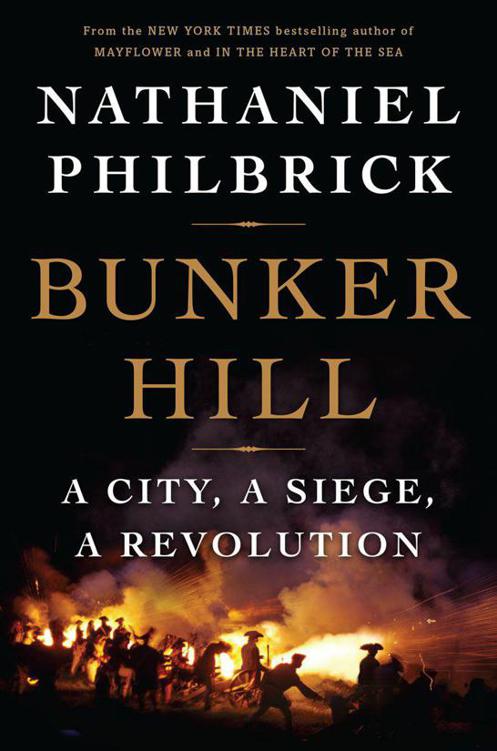
Bunker Hill: A City, a Siege, a Revolution
The American Revolution Series, Book 1
کتاب های مرتبط
- اطلاعات
- نقد و بررسی
- دیدگاه کاربران
نقد و بررسی

February 25, 2013
Like most popular historians, Philbrick (Mayflower) writes about discrete events, not large developments. And he’s good at it, even if the larger context is rarely considered and critical analysis gives way to story and celebration. Here, his focus is on events that began with the humiliations of the British at Lexington and Concord and ended with the siege of Boston, the American victory at Bunker Hill in 1775, and the departure in 1776 of British forces from New England’s largest city. Philbrick correctly presents the battle at Bunker Hill as a critical moment in the opening stages of the War for Independence, and displays an empathy for the out-maneuvered British caught in the traps that the Patriots laid for them. He wisely makes as one of his central figures the Patriots’ charismatic leader, Joseph Warren, who was killed at Bunker Hill, and who has since been largely forgotten, despite having been the man responsible for “orchestrating the on-the-ground reality of a revolution.” Philbrick tells his tale in traditional fashion—briskly, colorfully, and with immediacy. The book would have benefited from a point of view more firmly grounded in a contemporary evaluation of the battle, but even as it is—no one has told this tale better. Agent: Stuart Krichevsky, Stuart Krichevsky Literary Agency, Inc.

Starred review from March 15, 2013
National Book Award winner and Pulitzer Prize finalist Philbrick (Why Read Moby-Dick, 2011, etc.) will be a candidate for another award with this ingenious, bottom-up look at Boston from the time of the December 1773 Tea Party to the iconic June 1775 battle. Independence Day rhetoric extols our forefathers' battle for freedom against tyranny and unfair taxation, but the author points out that American colonists were the freest, most-prosperous and least-taxed subjects of the British Empire and perhaps the world. A century and a half of London's salutary neglect had resulted in 13 nearly independent colonies. Trouble began in the 1760s when Parliament attempted to tax them to help pay for the ruinously expensive victory in the French and Indian War. Unexpected opposition handled with spectacular clumsiness by Britain guaranteed trouble. Among Massachusetts' resistance leaders, most readers know John Hancock and Samuel Adams, but Philbrick concentrates on Joseph Warren, a charismatic young physician, unjustly neglected today since he died at Bunker Hill. His opposite number, British Gen. Thomas Gage, behaved with remarkable restraint. Despite warnings that it would take massive reinforcements to keep the peace, superiors in London goaded him into action, resulting in the disastrous April 1775 expedition to Lexington and Concord. They also sent a more pugnacious general, William Howe, who decided to expel colonial militias, now besieging Boston, by an uphill frontal attack on their entrenched lines, a foolish tactic. British forces succeeded but suffered massive casualties. It was the first and bloodiest engagement of the eight years of fighting that followed. A rewarding approach to a well-worn subject, rich in anecdotes, opinion, bloodshed and Byzantine political maneuvering.
COPYRIGHT(2013) Kirkus Reviews, ALL RIGHTS RESERVED.

April 1, 2013
Philbrick's newest work chronicles the cradle of the American Revolution, Boston's action-packed years of 177376. Opening with the consequences of the Boston Tea Party, Philbrick depicts the arrival of British army and naval forces, the manifestation of the royal government's intention to quash the burgeoning rebellion in Massachusetts. Its leaders, patriots like John Hancock, Samuel Adams, and Joseph Warren, provide the drama's counterpoise to British officials. Having deployed his characters, Philbrick launches each side's resort to military preparations and operations, a narrative that benefits from one of the author's several imaginative services to readers, detailing in word and map the geography of Boston and environs at that time. Another audience benefit is Philbrick's evocation of the look of patriot militias and British regiments, which enliven his crackling accounts of military movements that produced the Battles of Lexington, Concord, and Bunker Hill. Displaying, as in Mayflower (2006) and The Last Stand (2010), a superior talent for renewing interest in a famed event, Philbrick will again be in high demand from history buffs.(Reprinted with permission of Booklist, copyright 2013, American Library Association.)

December 1, 2012
Trust Philbrick, National Book Award winner for In the Heart of the Sea and Pulitzer Prize finalist for Mayflower, to offer a vivifying account of the Battle of Bunker Hill. With a ten-city tour.
Copyright 2012 Library Journal, LLC Used with permission.

April 15, 2013
National Book Award winner and Pulitzer Prize finalist Philbrick (In the Heart of the Sea) here gives readers a detailed account of the 1774 Battle of Bunker Hill, including the contentious preceding years and the months afterward, when George Washington ended the ten-month siege of Boston by forcing the British evacuation. Philbrick details the background, beliefs, motives, and decisions of key players from both sides, notably Boston's Joseph Warren, whose death at Breed's Hill was a devastating loss for the patriots, British general Thomas Gage, and Washington himself. Philbrick compellingly chronicles how the British mission to restore order, juxtaposed with the violence of Bostonian patriots, produced a volatile atmosphere. He exposes indecisiveness, confusion, incompetence, cowardice, and evenhandedness on both sides of the battle that marked a change from colonial attempts to preserve autonomy to a fight for independence. VERDICT This is the third recent popular history of the Battle of Bunker Hill, following James L. Nelson's With Fire and Sword and Paul Lockhart's The Whites of Their Eyes--each offering a unique but complementary perspective. Philbrick's is an exhaustively researched, intelligent, and engaging narrative with a sophisticated approach. Collections lacking the other two books should certainly acquire this; those with the others should consider this one too. [See Prepub Alert, 11/25/12.]--Margaret Kappanadze, Elmira Coll. Lib., NY
Copyright 2013 Library Journal, LLC Used with permission.

























دیدگاه کاربران